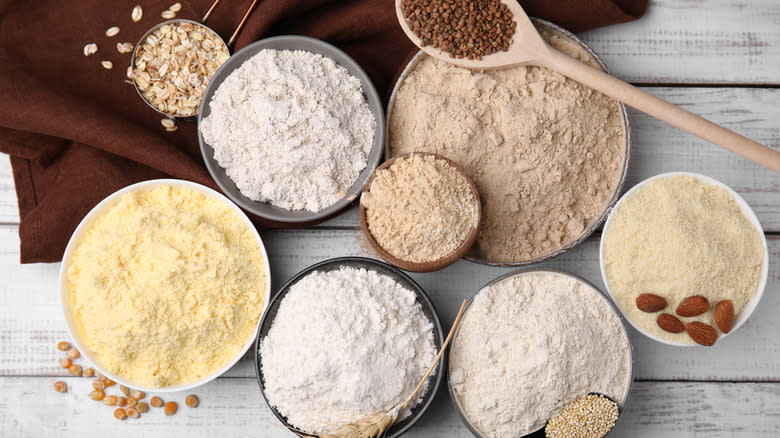Why You Should Use More Than One Type Of Flour To Bake Sourdough Bread

You've acquired a taste for the tangy allure of homemade sourdough bread and have mastered the basic white flour version. Prepping for your weekly sourdough Sundays ritual, you survey your pantry and your eyes drift towards all the different bags of alternative flours you've amassed these past months: einkorn, buckwheat, spelt, oat, hard winter wheat, and rye. An idea sparks in your head. Could you replace some of the white flour in your sourdough bread with any of these alternative flour?
The answer is yes. Sticking solely to white flour might seem like the safest and time-honed choice for homemade sourdough, but experimenting with a blend can unlock a world of flavors and textures. While white flour (or all-purpose flour) gives your sourdough its light, airy structure, introducing about 10 to 30 percent of an alternate flour can alter the outcome in delightful ways regarding the sourdough's taste and texture.
For instance, swapping out white flour with about 20% rye can bring a deep, earthy taste with a hint of malt. Spelt flour can introduce a nuttier undertone with subtle sweetness. Hard winter wheat, robust, sturdy, and slightly bitter, can make the crumb chewier and more substantial due to its added protein content. Thus, using more than one type of flour to bake sourdough can evolve and enhance its flavor and character.
Read more: 15 Best Knife Brands, Ranked
Mastering The Flour Blend For The Modern Sourdough Bread Baker

Diving into the world of alternative flour for sourdough is thrilling, but first, it's essential to understand the subtle shifts in baking techniques each alternate flour demands. It's best to heed the advice of seasoned bakers who've already navigated these waters. Kelson Herman, a long-time sourdough aficionado behind the Instagram account @starteright, shared his insights in an exclusive conversation with Tasting Table. Regarding rye, he said, "I like to use rye sometimes, but usually don't exceed 20% since it has a lower gluten content." This is essential to note, given that gluten content impacts the bread's elasticity and rise.
Herman continued, emphasizing the hydration needs of certain grains, "Whole grains require more water and need more time to soak in order to keep a similar structure to all white flour." Soaking whole grains helps soften and break down their tougher starches, making it easier for humans to digest.
A good general rule of thumb, per Herman, is to begin with integrating no more than 20% of an alternate flour into their mix, then gradually increasing the proportion in subsequent bakes to fine-tune your technique. In the world of homemade sourdough baking, the potential for innovation is huge. For those wishing to expand their repertoire, definitely experiment and incorporate different flours in your sourdough.
Read the original article on Tasting Table.


